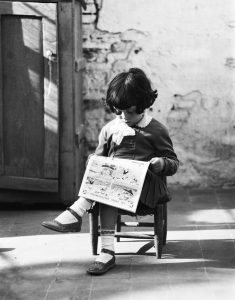
Come on Thursday 29 to Het Pand and get in the crowd to witness Eva Van de Wiele defend her thesis, Building a Glocalised Serial for Children: Corriere dei Piccoli (1908-1923) and TBO (1917-1932), and take part in the ensuing joyful celebrations.
Thesis abstract
This dissertation lies at the intersection of comics studies and childhood studies. It writes a transnational history of the two most long-running children’s comics magazines from Italy and Spain: Corriere dei Piccoli and TBO. Originating in 1908 and 1917, respectively, and issued by publishers with widely differing profiles, both magazines mixed international comics with national material in a new medium specifically aimed at children. This thesis examines this lesser-known publication format of the children’s comics magazine, in lesser-known languages, and from an under-researched period (up to 1932). Key themes include the ways in which both magazines appropriate transnational comics material, and the technique they use to edutain, loyalise and seduce the child reader. Part 1 focuses on the domestication of two international comics artists (Winsor McCay and Louis Forton) to identify which specific genres and serialised storytelling forms took precedence in CdP and TBO. While the former copied American serialised (child) characters from Sunday comics and experimented with ongoing narrative to cater exclusively to child readers, the latter entertained a cross-over audience with viral gags by French or Spanish comics creators or with adventure serials. Focusing on the weekly magazines, the second part of the thesis examines their effects on the reader. On the one hand, I argue with Margaret Beetham that magazines are more open than traditional texts: they simultaneously entertain and educate the reader through multimodal representations, and playful tasks, as well as encourage a horizontal relationship with the reader by stimulating the child’s input and activating the child. On the other hand, I approach comics magazines as mass products that contributed to the creation of a community of child consumers. Magazines did this by presenting the child as a consumer in their storyworlds and adverts or by inviting their readers to make use of their free time to consume. The two main aspects of this thesis, glocalisation and serialisation, were used as complementary analytical concepts to better understand the tools to harness a loyal reader (the child is amused; the parent finds use in that amusement) and create a commodified child. The thesis outlines gender differences and compares the weeklies with other (reading) material for children of the 1910s, 1920s and 1930s: including children’s literature, schoolbooks and other magazines, to games, toys and design. This contextualisation within children’s publications in general, and the specific comparison of children’s comics magazines from Italy and Spain, enriches our understanding of the complex and contradictory goals of children’s comics magazines and the manifold scripting of childhood.
Practical info
Thursday 29 September 2022, 17:30
Location: Het Pand, August Vermeylen Onderbergen 1, 9000 Gent
Directions: https://soleway.ugent.be/routes/1828
Following the defense, we will have a small celebratory drink together.
Please confirm your presence before 22 September via https://eventmanager.ugent.be/doctoraatsverdedigingEvaVandeWiele
Following the defense, we will have a small celebratory drink together.
Please confirm your presence before 22 September via https://eventmanager.ugent.be/doctoraatsverdedigingEvaVandeWiele